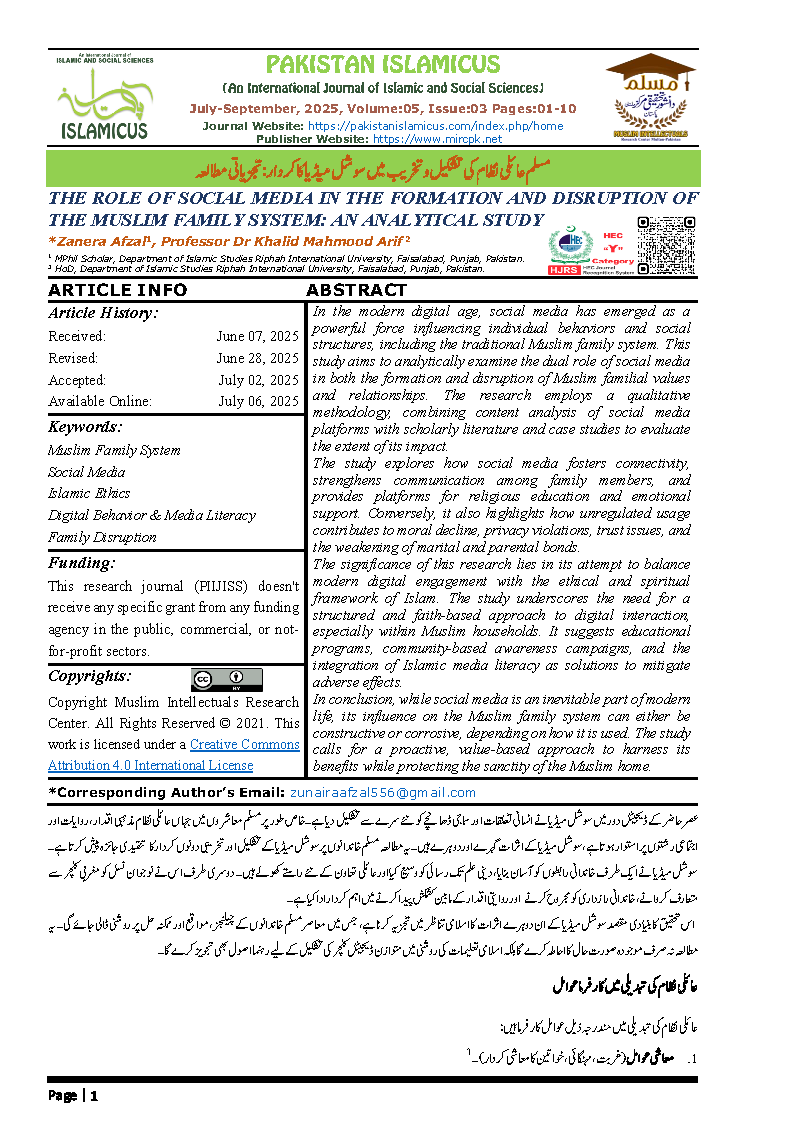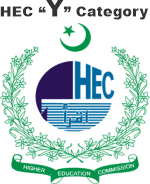مسلم عائلی نظام کی تشکیل و تخریب میں سوشل میڈیا کا کردار: تجزیاتی مطالعہ
THE ROLE OF SOCIAL MEDIA IN THE FORMATION AND DISRUPTION OF THE MUSLIM FAMILY SYSTEM: AN ANALYTICAL STUDY
Keywords:
Muslim Family System, Social Media, Islamic Ethics, Digital Behavior & Media Literacy, Family Disruption.Abstract
In the modern digital age, social media has emerged as a powerful force influencing individual behaviors and social structures, including the traditional Muslim family system. This study aims to analytically examine the dual role of social media in both the formation and disruption of Muslim familial values and relationships. The research employs a qualitative methodology, combining content analysis of social media platforms with scholarly literature and case studies to evaluate the extent of its impact.
The study explores how social media fosters connectivity, strengthens communication among family members, and provides platforms for religious education and emotional support. Conversely, it also highlights how unregulated usage contributes to moral decline, privacy violations, trust issues, and the weakening of marital and parental bonds.
The significance of this research lies in its attempt to balance modern digital engagement with the ethical and spiritual framework of Islam. The study underscores the need for a structured and faith-based approach to digital interaction, especially within Muslim households. It suggests educational programs, community-based awareness campaigns, and the integration of Islamic media literacy as solutions to mitigate adverse effects.
In conclusion, while social media is an inevitable part of modern life, its influence on the Muslim family system can either be constructive or corrosive, depending on how it is used. The study calls for a proactive, value-based approach to harness its benefits while protecting the sanctity of the Muslim home.
Downloads
References
Wilson, W.J. The Truly Disadvantaged: The Inner City, the Underclass, and Public Policy. University of Chicago Press, 1987, 92-95
Park, R.E. Race and Culture. Free Press, 1950, 204-207
Wirth, L. Urbanism as a Way of Life. American Journal of Sociology, 44(1), 23-24
Mawdūdī, Sayyid Abū al-A‘lā. Islāmī Niẓām-e-Ma‘īshat ke Uṣūl aur Maqāṣid. Lahore: Islamic Publications, 1439 AH/2018, 15–16.
Samī‘a, Sa‘diyya. Khawātīn kī ‘Aṣrī Ma‘āshī Sargarmiyyōn ke ‘Ā’ilī Niẓām par Atharāt: Islāmī Ta‘līmāt kī Rawshanī mein Jā’iza. MPhil diss., Bahauddin Zakariya University, Multan, 1437 AH/2016, 159
Wilson, W.J. The Truly Disadvantaged: The Inner City, the Underclass, and Public Policy. University of Chicago Press, 1987, 92-95
Park, R.E., & Burgess, E.W. Introduction to the Science of Sociology. University of Chicago Press, 1921, 161-165
Park and Burgess, Introduction to the Science of Sociology, 228–231.
Park, R.E. Race and Culture. Free Press, 1950, 112- 115
Park, Race and Culture, 204–207.
Burgess, E.W. The Family: From Institution to Companionship. American Book Company, 1963, 35-39
Burgess, The Family: From Institution to Companionship, 142–145.
Wirth, L. Urbanism as a Way of Life. American Journal of Sociology, (1938) 44(1), 18-21
Burgess, E.W. (1945). The Family in a Changing Society. University of Chicago Press, 1945, 67 - 70
Burgess, The Family in a Changing Society, 88- 91
Hampton, Keith N., Lauren Sessions Goulet, and Lee Rainie. Social Networking Sites and Our Lives. Pew Research Center, 2011, 23-25. https://www.pewresearch.org/internet/2011/06/16/social-networking-sites-and-our-lives/
Rainie, Lee, and Barry Wellman. Networked: The New Social Operating System. MIT Press, 2012, 145- 147
Jawād, Ḥasan. Islāmī Ta‘līmāt aur Jadīd Mu‘āshara. Lahore: Kutub Khāna Ḥaq, 1437 AH/2016, 93.
Asadullāh, Sājid, and Khalid Maḥmood Arif. “Nawjawān Nasl ke Mu‘āṣir Manfī Rawiyye aur social media.” At-Tabyīn 6, no. 1 (2022): 53–72.
Anwār, Farīd. Islām aur Maghrib. Karachi: Al-Azhar Book House, 1434 AH/2013.
‘Awda, ‘Abd al-Qādir. Al-Islām bayn Jahl Abnā’ih wa ‘Ajz ‘Ulamā’ih. Cairo: Maktaba Dār al-Qalam, 1430 AH/2009, 2nd ed., 8.
Qādirī, Sayyid Aḥmad ‘Urūj. Islām ke ‘Ā’ilī Qawānīn. New Delhi: Markazī Maktaba Islāmī, 1436 AH/2015, 69–79.
Al-Bukhārī, Muḥammad ibn Ismā‘īl, Abū ‘Abd Allāh. Al-Jāmi‘ aṣ-Ṣaḥīḥ. Kitāb an-Nikāḥ, Bāb Idhā Bātat al-Mar’a Muhājira Firāsh Zawjihā, ḥadīth 5194. Beirut: Dār Ṭawq an-Najāh, n.d.
An-Nisā’, 4:34.
Muslim, Abū al-Ḥasan ibn al-Ḥajjāj al-Qushayrī. Al-Jāmi‘ aṣ-Ṣaḥīḥ. Kitāb an-Nikāḥ, Bāb Taḥrīm Ifshā’ Sirr al-Mar’a, ḥadīth 1437. Beirut: Dār al-Fikr, 1411 AH/1990.
Aḥmad ibn Ḥanbal. Musnad Aḥmad. Bāb Faḍā’il al-A‘māl, ḥadīth 1661. Riyadh: Dār as-Salām, 1431 AH/2010.
Al-Isrā’, 17:23.
At-Tirmidhī, Abū ‘Īsā Muḥammad ibn ‘Īsā. Sunan at-Tirmidhī. Kitāb al-Birr wa aṣ-Ṣila, Bāb Mā Jā’a fī Riḍā al-Wālidayn, ḥadīth 1899. Riyadh: Dār as-Salām lil-Nashr wa at-Tawzī‘, 1431 AH/2010.
Al-Bukhārī, Al-Jāmi‘ aṣ-Ṣaḥīḥ. Kitāb al-Adab, Bāb Man Aḥaqq an-Nās bi-Ḥusn aṣ-Ṣuḥba, ḥadīth 5971.
Al-Isrā’, 17:24.
Abū Dāwūd, Sulaymān ibn al-Ash‘ath as-Sijistānī. Sunan Abī Dāwūd. Kitāb al-Adab, Bāb fī Taghyīr al-Asmā’ al-Qabīḥa, ḥadīth 4948. Beirut: Dār al-Kutub al-‘Ilmiyya, n.d.

Downloads
Published
Issue
Section
License
Copyright (c) 2025 PAKISTAN ISLAMICUS (An International Journal of Islamic & Social Sciences)

This work is licensed under a Creative Commons Attribution 4.0 International License.
This work is licensed under a Creative Commons Attribution 4.0 International License.
































